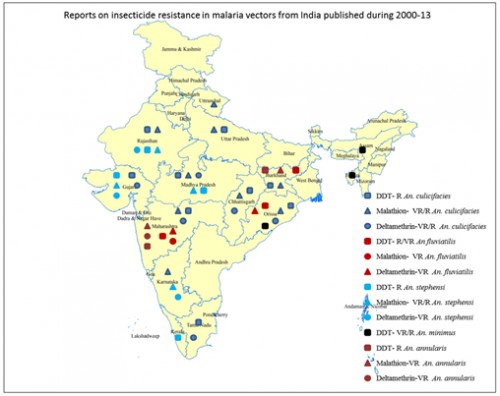Vol. 1, Issue 1, Part A (2014)
Insecticide susceptibility status of malaria vectors in India: A review
Author(s): Raj Kumar Singh, Gaurav Kumar, Pradeep Kumar Mittal
Abstract: Malaria is a disease caused by the biting of the Anopheline mosquito vectors. Vector control is the major component of the strategy for malaria control which aims to prevent parasite transmission through interventions targeting adult malaria vectors. For this, chemical, biological and mechanical methods are applied. In chemical approach of controlling malarial mosquitoes, insecticides have been used extensively for larviciding, indoor residual spraying and impregnation of bed nets in the last few decades. As a result of this, vector resistance to these insecticides have been recorded in various parts of the country and mosquitoes have developed wide spread resistance to some of these insecticides. There is need for countrywide and regular surveys for monitoring the insecticide susceptibility status of major vectors and assessing their implications on vector control activities. In India, most of the studies revealed that resistance against DDT is prevalent in most of the malaria vector species. Bye and large, An. culicifacies and An. stephensi are resistant to malathion also and resistance against synthetic pyrethroid is developing. Moreover, An. fluviatilis, An. minimus and An. annularis are susceptible to malathion and deltamethrin. As the chemical molecules available for the role of insecticide are very few and invention of new molecules takes time, this is the need of time that increasing trend of resistance status of mosquitoes against the insecticides used in the vector control programme have to be minimized. There are only a few reports on the susceptibility status of the mosquitoes against various insecticides and thus more emphasis on these studies should be given. Again the appropriate use of the insecticides like rationale use with rotation of insecticides and insecticide combinations can be an effective strategy to combat this insecticide resistance.

Fig.: Insecticide susceptibility status of malaria vectors in India
Pages: 05-09 | 2179 Views 248 Downloads

How to cite this article:
Raj Kumar Singh, Gaurav Kumar, Pradeep Kumar Mittal. Insecticide susceptibility status of malaria vectors in India: A review. Int J Mosq Res 2014;1(1):05-09.







